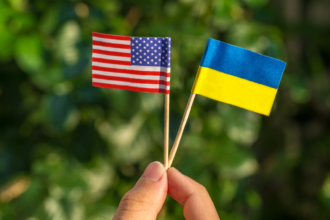As Ukrainian soldier Serhiy Petchenko defended his nation against Russian invaders in June 2023, he lost both hands. After surviving the fierce and relentless fight for the city of Bakhmut, his sad injury happened far from the frontlines in a railway accident. That was the moment the 42-year-old soldier found himself helpless and hopeless.
- How did the Superhumans Center support Serhiy's recovery?
- At the Superhumans Center, what is their vision?
- Is it possible for trauma to provide strength?
- In what ways could severe injuries affect relationships and families?
- How can women help Ukraine be resilient?
- In essence, can resilience and hope define a fresh future for Ukraine?
Against all odds, however, Serhiy has discovered tenacity and hope in his rehabilitation and attempted to reconstruct his life and support his family. Today, he is poised at the entrance of a newly opened café in Lviv, ready to start a fresh chapter.
Serhiy says, his face lit by a broad smile as he stands with his arms at his sides, “I never thought I would be here today, opening a business.” ” Our love helped us survive.”
How did the Superhumans Center support Serhiy's recovery?
Beginning his path toward recovery at the Superhumans Center, a rehabilitation facility outside of Lviv for individuals injured in the continuing conflict with Russia, the clinic offered him thorough rehabilitation and premium prosthetic hands. It was not only physical healing; the facility also taught Serhiy and his wife, Anna, to run a family company so they could enter civilian life despite their present difficulties.
“I learned how to live with my new disability at the Superhumans Center, but I also got the chance to return to a normal life,” Serhiy says. “It was the emotional as much as physical support I required to start again.”
Founded in response to the excessive war-related injuries, the Superhumans Center has assisted thousands of Ukrainians like Serhiy in recovering their dignity and independence. The Ukrainian Health Ministry claims that among both military and citizens, over 50,000 Ukrainians have lost limbs in almost three years of conflict. Many of these injuries arise from delays in evacuation, in which case the severe battlefield circumstances prevent patients from reaching medical treatment in time.
“Some people have double, triple, quadruple amputations,” Olga Rudnieva, CEO and co-founder of the Superhumans Center, notes. While some of these folks may use wheelchairs, all will need prostheses. Ukraine will start to be a nation of individuals with impairments, but we aim to normalize handicaps. We want to demonstrate that one should not be afraid of this.”
At the Superhumans Center, what is their vision?
Olga, who co-founded the institution among the Russian missile strikes in 2022, underlines that although the conflict has left Ukraine with an excessive number of disabled people, it has also produced a great degree of endurance.
“Most people here at the center shouldn’t be alive,” Olga says as she moves among the patients. “The fact that they are a miracle in and by itself.”
With almost a million frontline troops, the center seeks to fill the voids created by overburdened military hospitals and clinics. The Superhumans Center opened in April 2023 and has seen around 800 of its over 1,000 patients—military members and civilians—have prosthetic limbs. For many, it’s a road toward reclaiming life.
Olga says, pointing to the patients actively learning to walk again with their new prosthetic limbs, “This is the global headquarters of resilience.”
Among the patients are young men with double and triple amputations who, despite their injuries, are resolved to be independent. Some even ask Olga to check their development, highlighting the power and will need to propel them ahead.
Is it possible for trauma to provide strength?
One of the center’s fundamental ideas is that trauma may empower or break someone. Olga fervently promotes this idea, showing how some severe injuries have resulted in amazing metamorphosis.
“We think trauma can empower you,” she says. “The trauma might ruin you or help you to develop your superpower.”
Celebrities such as British adventurer Bear Grylls, Virgin chairman Richard Branson, artist Sting, and actress Trudie Styler have come together behind the center’s purpose to support this concept. Using worldwide fundraising initiatives, the center has offered modern prostheses and reconstructive operations—qualities important for the healing of the afflicted.
Understanding that the effects of battle injuries go much beyond physical healing, the clinic provides psychological and emotional care and physical therapy. Patients are taught to negotiate their new life with fresh hope and purpose, therefore addressing their whole recovery.
In what ways could severe injuries affect relationships and families?
For many, a catastrophic injury strains families and relationships in addition to being a personal burden. Anna, Serhiy’s wife, stayed at his side for six months, offering constant encouragement for his recovery. Although tending to a loved one with a chronic impairment takes a great emotional toll, it also deepens their relationship.
“Anna never left me,” Serhiy notes. “Her presence satisfied all I needed. I wonder how I would have survived without her.”
Olga is quite conscious of the difficulties families experience at the Superhumans Center. She typically guides couples through the challenging decisions and adjustments from combat injuries. She even helps patients and their families make life-altering decisions, including whether to live together or apart.
One well-known example is Olena, a Kostiantynivka bakery manager who lost her leg in a Russian missile hit en route to her mother’s birthday celebration. Olena is injured but still sees great promise for the future and is ready to regain her autonomy.
“If the weather is good, the first thing I’ll do when I have my artificial leg is just go for a walk,” Olena adds, her voice full of expectancy. “I’ll walk simply to remember how it feels, without hurry or goal.”
At the Superhumans Center, where patients come from all walks of life—soldiers, citizens, even children—Olena’s story is only one of many. Olga is familiar with the specifics of their pasts, families, and daily lives. Often referred to as “Mum” by the soldiers, who consider her a second mother, she has grown to be a reliable source of their healing.
How can women help Ukraine be resilient?
One instance of women being crucial in Ukraine’s war effort is Olga’s leadership at the center. Although combat is sometimes considered a masculine realm, Ukrainian women have stepped up not to fulfill conventional responsibilities and spearheads and frontline fighting them feminist, I was first afraid as the war started,” Olga says. “War is a very male phenomenon; hence, I assumed feminism’s end was here. Later, though, I saw that women had shown themselves remarkable during this battle.”
Women in Ukraine have assumed previously unthinkable jobs, from operating rehabilitation institutions to managing humanitarian hubs. They have taken leadership roles and shown amazing will and fortitude against unthinkable hardship.
“I’m proud to be among Ukrainian women,” Olga adds, her words almost lost in the sound of sirens, a continual reminder of Ukraine’s ongoing conflict.
In essence, can resilience and hope define a fresh future for Ukraine?
Serhiy’s path is evidence of the fortitude and will of the human soul. Though he and his family have endured difficult times, his rehabilitation, business initiative, and support of Superhuman Center have given him fresh hope. Thousands of others all around Ukraine share his narrative, people learning to live with their limitations and welcome the chance of fresh starts.
Organizations like the Superhumans Center provide not only medical treatment but also a vision of a future whereby handicap is accepted, trauma is turned into strength, and resilience becomes a national identity as Ukraine heals from the scars of war.
Russian Airstrikes Injure Dozens in Kharkiv Amid Escalating Tensions with Ukraine








